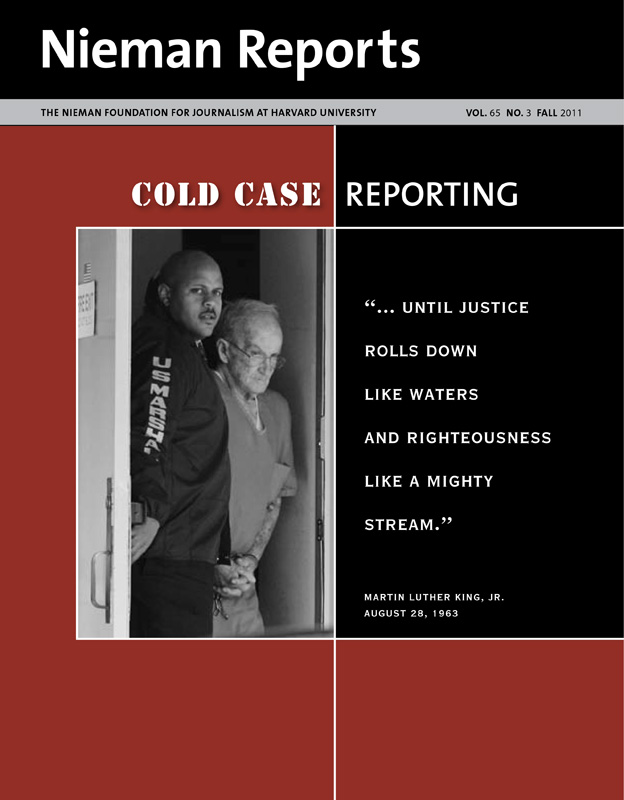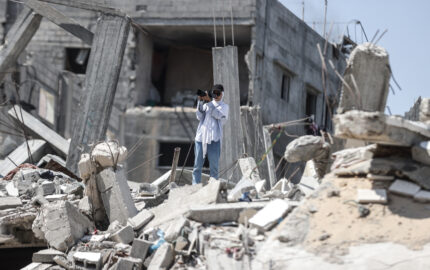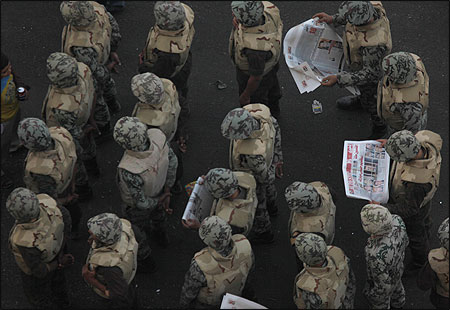
Egyptian soldiers read newspapers as they waited in anticipation of a demonstration in Cairo’s Tahrir Square. Photo by Enric Marti/The Associated Press.
In Egypt, working for a state-run news organization has had its advantages—but it's had disadvantages, too, during our changing political times. In 1994, when I started my career, I worked for Al-Shabab magazine, which was backed by the 114-year-old newspaper Al-Ahram. This gave me the boast of having access to a wide network of sources. Over time, being associated with state-run media turned into a major drawback when we got tagged as "pro-government" reporters. I was not affected as some colleagues were since our magazine focused on the concerns of Egyptian youth, and before Egypt's revolution this spring, the word "youth" was not synonymous with "politics."
In 2005, I moved to the business section in the daily Al-Ahram. That was the year President Hosni Mubarak was elected to a fifth consecutive six-year term and the Egyptian people were restive; some took to the streets for the first time in 24 years shouting "enough." It was then that I realized the need to bring a political dimension into my stories, both in reporting on what was happening and in expressing my opinion based on what I was learning. But this was not possible to do at Al-Ahram, given that my thoughts were too strongly opposed to the Mubarak regime.
Fortunately, blogs were flourishing in Egypt by then. Still working at Al-Ahram, I set up my first independent blog, "Ala Baab Allah," which could be translated into English as "a seeker of God's support." At that time, what we now think of as independent media—entities that gather and deliver news without state affiliation—were not visible in Egypt. So other bloggers similarly turned to posting their words online. The emergence of these digital stories and commentary led a young couple, Alaa Abd El Fattah and Manal Hassan, to create an aggregator blog, on which they posted links culled from thousands of blogs.
There were no protections for those writing against the Mubarak regime. Bloggers were arrested for what they wrote or for participating in demonstrations. In a 2007 case that received global attention, Kareem Amer received a four-year prison sentence for blogging about religion and the president. I wasn't ready to spend time behind bars so I kept my blogging name secret, and later I set up a blog called Masrawyya, in which I mentioned my real name.
During the next few years, as I was traveling between the United States and Egypt for different reasons, nonstate-run media began to be visible in Egypt. Their roots actually go back to 2004 when Al-Masry Al-Youm newspapers was launched, and that was followed by the emergence of other nonstate-run papers and TV channels. But these were not independent media, in the common usage of this term; they were privately owned media, owned and controlled by pro-regime businessmen.
Three incidents—one occurring in 2009, two in 2011—illustrate the consequences of this distinction:
- In April 2009, the "independent" Al-Shorouk newspaper fired a reporter, Eman Abdel Moneam, for no clear reason other than that she had an Ikhwani fiancé, who is now her husband and the father of her 3-month-old baby girl. As Abdel Moneam wrote in a blog post, "Is it a crime to have a Muslim Brotherhood fiancé?" After she announced her engagement, the newspaper's management took away the beat she had been assigned and later fired her. At that time, government officials intervened in hiring and firing decisions at state-run media, but it was unusual for this to happen at an "independent" newspaper. Such practices, many of us believed, would cease after February 2011 when Mubarak's regime ended. Unfortunately, this has not been the case.
- In March 2011, the prominent political columnist Ahmed El-Sawi was forced to leave Al-Masry Al-Youm after he wrote a column about El Sayyid El-Badawi, the pharmaceutical group mogul turned media mogul who owns a daily newspaper and a TV network, leads a political party, and holds shares in a few other "independent" newspapers and advertising agencies. The columnist raised questions about El-Badawi's relationship with the Mubarak regime and asked him to clarify his business dealings with it. The El-Badawi media empire lashed back with a campaign pressuring Salah Diab, the owner of Al-Masry, and raised questions of its own about Diab's relationship with the father-in-law of Mubarak's son, Gamal. The three-month battle ended after El-Sawi was hospitalized in intensive care due to the pressure and stress he experienced. On June 14, he resigned from Al-Masry Al-Youm and moved the next day to the newspaper Al-Shorouk, where he resumed his column.
- The third incident happened in late July when popular TV host Dina Abdel Rahman, who worked for Dream TV, was fired after she challenged General Abdel Monem Kato, a consultant for the Supreme Council of Armed Forces. Kato had tried on air to accuse Egyptian columnist Naglaa Badeer of betraying her nation. Rahman didn't accept Kato's accusation and responded that Badeer had dedicated her career to giving voice to the aspirations of her fellow Egyptians. The owner of Dream TV, Ahmed Bahgat, a close business associate of the Mubarak regime, fired Rahman after they had a heated discussion on the phone.
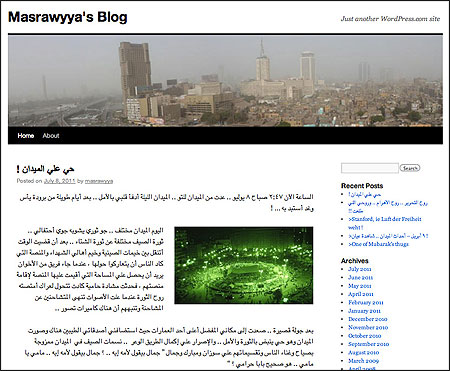
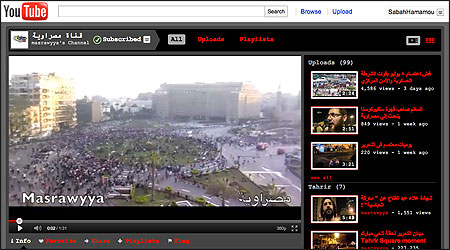
Egyptian journalist Sabah Hamamou’s blog, Masrawyya, gives her an outlet to express her opinions and her YouTube channel provides her with a way to share videos she’s been making since the uprising in Tahrir Square.
Independent News Media
When a country such as ours has state-run news media, with government interference an established practice, and the editorial practices of privately owned news media are influenced by the state as well, then the question becomes whether there is such a thing as independent media in Egypt. To me, the difference is insignificant.
Yet in this disheartening traditional media landscape, we find encouraging signs of independent media—in the truest sense of the phrase—being established in Egypt.
On January 25, from my office window at Al-Ahram I could see waves of demonstrators heading toward Tahrir Square. I grabbed my camera, headed there, and shot footage of the demonstration. When I came back to my office, I knew I could no longer conceal my feelings about the events taking place and write what Al-Ahram wanted and expected me to write.
That day I created my own YouTube channel. During the next two weeks I constantly uploaded the videos I shot on the streets and in Tahrir Square. To give people the time and freedom to speak for themselves, I did minimal editing. I also encouraged those who watched the videos to share them through a Creative Commons license. By now videos on my Masrawyya channel have been viewed more than half a million times. I am also working on a start-up project to spread practical information about social media and ways to use it professionally. I call this project "Masrawyya—Egyptian Media Hub," and it is among the first of what I am certain will be more media development nongovernmental organizations in Egypt. Through it, I provide training for journalists, media students, and others interested in seeing independent news media flourish.
Also on January 25, another group of technologically savvy young Egyptians launched Rassd News Network (RNN) through Facebook. On it, they post news from their network of reporters—many who do this as volunteers—and from other media outlets. RNN has attracted nearly one million fans. Another independent media initiative is Qabila TV, which operates with high standards as it raises political awareness among Egyptians. Qabila TV was set up by a group of Egyptians in their 20's who also oversee a website, YouTube channel, and Facebook page. Since March, their YouTube videos have been watched more than half a million times.
In the broader Arab region, cofounder Wael Attili pioneered the use of the Internet as a platform for Kharabeesh, an independent new media organization founded in 2008 in Jordan and a YouTube partner. Jordanians, Tunisians and Egyptians as well as residents of other Arab countries are members of the editorial team. The owners funded it with money borrowed from family and friends and have tried to attract venture capital from Dubai. Kharabeesh produces a blend of political and entertainment content, what it describes as "original and genuine Arabic minicartoon shows" that are streamed over the Internet and mobile networks. The videos on Kharabeesh's YouTube channel have been viewed close to 17.5 million times.
In Egypt, Bassem Youssef, who is not a reporter, became a superstar when he started commenting on the media's performance on his YouTube channel. At the time, his main job was as a cardiologist, but like so many Egyptians he was furious at the extreme bias state-run media displayed in its coverage of the revolution. So he set up a YouTube channel to compare news coverage of the revolution before and after Mubarak stepped down. His YouTube videos led to him receiving an offer from ONTV, a channel owned by businessman Naguib Sawiris. Youssef agreed to move to ONTV and is now preparing his show. Foreign reporters have written about him, often calling him the Egyptian Jon Stewart.
Today in Egypt, these three types of media compete for people's attention: state-run media are adapting but likely not fast enough to changing sensibilities and expectations; privately owned media are flush with financial resources and talent but sometimes lacking in credibility, the key element of news reporting; and entrepreneurial digital and social media are scrambling for resources but appear to be gaining in influence and public attention.
Still, as distinct as these media entities are, they feed on one another. Often a news story gets its start either in state-run or privately owned media. That news gets picked up and shared, digested and commented on via social media, and that process can lead to a new story coming out of the more traditional outlets. And so the cycle goes. While it is impossible to predict, one can wonder whether the trends we see will lead us to a time when traditional media will be integrated with social media. While I await the answer, I will keep my camera on the Egyptian people and share what they tell me on media that remain free from state interference.
Sabah Hamamou is deputy business editor at Al-Ahram newspaper, founder of Masrawyya—Egyptian Media Hub, a start-up website for new media. In 2006 she studied at Northwestern University as part of a fellowship for Arab journalists. She was a Knight-Wallace Fellow at the University of Michigan in 2009-2010. She is author of "Diary of a Journalist at Al-Ahram," which is being published this fall.
